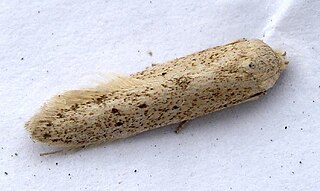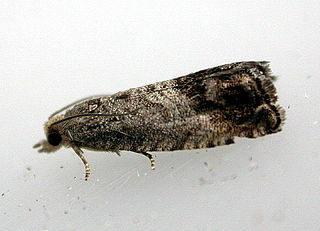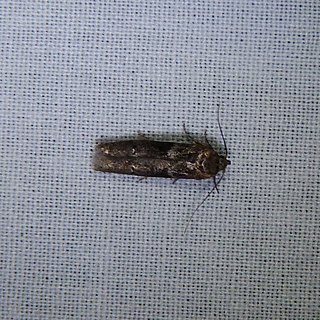
Blastobasis is the type genus of the gelechioid moth family Blastobasidae; in some arrangements these are placed in the case-bearer family (Coleophoridae) as a subfamily. Within the Blastobasidae, the subfamily Blastobasinae has been established to distinguish the Blastobasis lineage from the group around Holcocera, but the delimitation is not yet well-resolved.

Cydia splendana, the chestnut tortrix, is a moth of the family Tortricidae. It is found in Europe. It is also known as the acorn moth, but this can also refer to Blastobasis glandulella from North America, which belongs to the more primitive family Blastobasidae.

Blastobasis adustella is a species of moth of the Blastobasidae family. It is endemic to Australian region, but was introduced in western Europe and is now reported from The Netherlands, Great Britain, Ireland, Madeira and the Azores
Blastobasis vittata is a moth of the family Blastobasidae. It was thought to be endemic to Madeira but is now known to inhabit the Netherlands, France, the Channel Islands,England and Northern Ireland.

Blastobasis glandulella is a species of moth of the Blastobasidae family. It is found in the eastern United States and southern Ontario, Canada. It has also been recorded in California. In Europe, it has been recorded from Austria, Germany, the Czech Republic, Italy, Slovakia and Croatia.
Blastobasis quaintancella is a moth in the family Blastobasidae. It is found in the eastern United States, including Maine and Florida.
Blastobasis repartella is a moth in the family Blastobasidae. It is found in the United States, including Colorado, Maine, South Dakota and Illinois.
Blastobasis decolorella is a moth in the family Blastobasidae. It is found on Madeira and in Portugal. Records from England and possibly also the Netherlands are based on misidentifications of Blastobasis lacticolella.
Blastobasis magna is a moth in the family Blastobasidae. It is found on the Channel Islands, in Italy, Portugal, Spain and on Sardinia and Sicily.
Blastobasis ochreopalpella is a moth in the family Blastobasidae. It is found on Madeira.
Blastobasis anachasta is a moth in the family Blastobasidae. It was described by Edward Meyrick in 1931. It is found in Brazil.
Blastobasis aphanes is a moth in the family Blastobasidae. It was described by Philipp Christoph Zeller in 1877. It is found in Colombia.
Blastobasis controversella is a moth in the family Blastobasidae. It was described by Zeller in 1877. It is found in Colombia.
Blastobasis decolor is a moth in the family Blastobasidae. It was described by Meyrick in 1907. It is found in Sri Lanka.
Blastobasis parki is a moth in the Blastobasidae family. It was described by Sinev in 1986. It is found in Russia.
Blastobasis proagorella is a moth in the family Blastobasidae. It was described by Zeller in 1877. It is found in Colombia.
Blastobasis suppletella is a moth in the family Blastobasidae. It was described by Zeller in 1877. It is found in Colombia.





